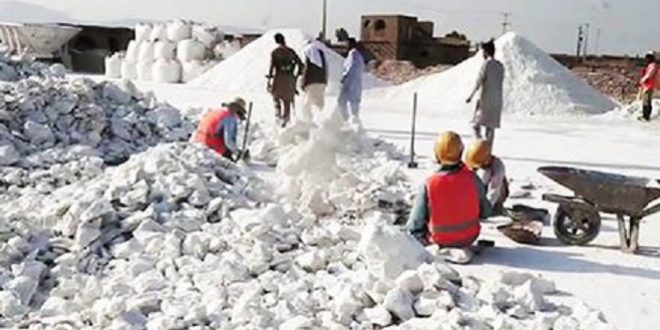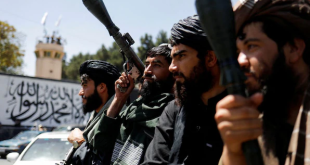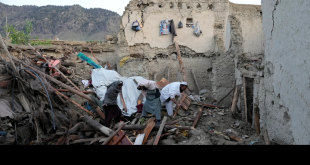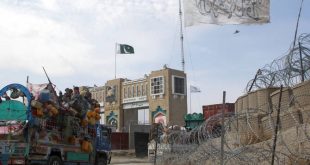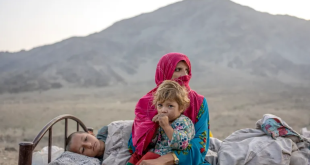The Soviet intervention in Afghanistan at the close of 1979 was a significant event that we can not overlook when analysing the situation as it exists today. The year between 1977 and 1987 saw a steady inflow of Afghan refugees into Pakistan and the use of Pakistan as a conduit for arms for the Afghan war. As a result of this two trends emerged to fuel the crisis of civil society a large proportion of weapons meant for the Afghan guerillas filtered into the illegal arms market and, a rapid growth of the heroin trade. Powerful Mafia-type syndicates emerged to operate the production, domestic transportation and export of heroin. Many Afghan refugees, who had taken over a significant share of inter-city overland Cargo services, also became integrated into the drug syndicates. In 1980s the states’ authority weakened over the basic functions of the state. Cultivation of opium in Afghanistan provided a fertile land there to flourish drug trafficking in the region. The Government of Pakistan and its army had been encouraging this business with a view to take maximum advantage. Afghan Mujahideen with the active support of drug smugglers of Islamabad, Pakistani government and its army began to spread the drug-trafficking in the region.
Changes began in social character
The Islamic Jehad, like any other multinational, is now truly a globalised entity, and it has no love for soft Islamic parties that rule elsewhere. Even the origins of al-Queda and other terror groups during the Afghan war of 1979-92, their fight against the Soviet army and the role of the US, Pakistan, Saudi Arabia and others is well known. Its mentor and chief Osama bin Laden started a drive to recruit Muslim volunteers worldwide. US officials estimate that tens of thousands of foreign fighters were trained in bomb-making, sabotage and guerilla warfare tactics in Afghan camps that the CIA helped set up between 1985 and 1992. Taliban and Al-Queda are not merely the names of organisations. They stand for an aberrant mental outlook and a highly regressive socio-political agenda, which rejects the ideals of pluralism, secularism, freedom and democracy and has no respect even for national boundaries. For the pursuit of its goal to establish global hegemony, it considers the use of terrorism domestically as well as its aggressive export to countries near and far entirely legitimate.
Beginning from 1979 Pakistan became the most important ally of USA in this part of the world and the weapons for Afghan Mujahideen were passed on through Pakistan. It enabled Pakistan to receive substantive military aid as well as quite acceptance of its indulgence in nuclear technology extended by China. Pakistan’s involvement with Islamic terrorism has made it a global offender. The Pan-Islamic Wahabite agenda of the Taliban movement which was born and nurtured by the Jamaat-e-Ulema-e-Islami and by Pakistan’s Inter-Services Intelligence (ISI) in the madrasas of Pakistan’s North-West-Frontier Province and Baluchistan, today threatens all the countries of the region. Neither the West-Asian countries with their incipient transition to somewhat more liberal societies, nor Iran, the Central Asian Republics, India nor even China remains unaffected by this militant agenda.
Thus, terrorism, religious bigotry and drug-trafficking made for a deadly cocktail and Pakistan began to move in the direction, previously unknown to its social and economic system. These evils are like a balloon. We squeeze it at one end and it reappears at the other. The people of Pakistan are caught in the crossfire of a war not of their making, living like feudal serfs under the shadow of the mullahs, gangsters and mercenaries, a force that clearly seems more feared than respected. The land is now increasingly in the grips of a coterie of retired Generals who occupied the top posts in the army during 1980s Afghan operation. They made billions out of the CIA during that period and set up madrasas to create a cadre of Islamic militants. Even though the Generals have retired, still they call the shots. They influence appointments in the army and their protégés run the ISI. Pakistan’s meddling in Afghanistan led to Talibanisation of parts of Pakistan itself. It released a miasma of terrorism from which most of the world now suffers. Pakistan is no exception.
Developments after Zia-ul-Haq
Death of General Zia in August 1988 in an air crash was followed by the formal end of the Soviet takeover in Kabul in February 1989. After his death the military establishment quickly found a set of politicians, collected under one banner by ISI, with General Hamid Gul, the then Chief, in the name of Islamic Jamhoori Ittehad (IJI) to disrupt democratic process in the country. The nexus saw Afghanistan as its strategic backyard. At the other end, the Soviet withdrawal marked the end of an era. The supply of US arms which were given to Afghan rebels to fight the Soviet army and Pakistan to protect itself from Soviet influences were suddenly came to a halt. The US was not in favour of establishing the kind of government in Kabul that Afghan rebels wanted. Further the pro-US element in Kabul also suffered a set back on account of Gulf crisis that prevented them to be famous internationally but, more so to Soviet disintegration which marked the end of cold war between the two superpowers and made US least interested in Afghan affair.
In the situation where the Soviets had left and the CIA lost interest, Islamabad took over. Seeking strategic depth, Pakistan turned Afghanistan into a colony. It was a brilliant foreign policy initiative wrecked by inept execution. It brought Pakistan dangerously close to being branded a terrorist state. Soviets’ exit was followed by the installation of a communist regime headed by Najibullah. The Generals of Pakistan wanted to send troops to overthrow the Najibullah government. They backed the Taliban and the communist regime collapsed in 1992. In the post-Afghan period, though Pentagon helped during 1992-95, with the movement of thousands of mujahideen and other Islamic elements from Central Asia, even some Turks, into Europe to fight alongside Bosnian Muslims against the Serbs, a large number of Afghan mujahideen became irrelevant to the US. Once the Afghan jehad was over, the Generals did not know what to do with the fighters being turned out by the madrasas. One option was to turn them into private militias and to use them to terrorise Pakistan’s minorities. The other, more attractive alternative, was to export them to Kashmir to try and repeat the so-called Afghan jehad.
Role of Pakistan in Afghan terrorism
However, many perceptive Pakistanis express serious concern over their government’s appeasement of terrorism fueled by religious extremism. They have voiced alarm over how Pakistan’s social fabric and its institutions have been grievously affected by its government’s policy of creating and systematically promoting the Taliban, ostensibly to gain strategic depth in Afghanistan and a force multiplier for its anti-India campaign in Jammu and Kashmir. Benazir Bhutto in her book, Pakistan the Gathering Storm, published in 1983, had also criticized the government’s role in continuing disturbances. “Pakistan can not sustain its present role in the Afghan insurgency. It is creating unacceptable security risks for the country. The coterie of Generals headed by Zia cannot cope with this situation. At any rate, his role in promoting extreme right-wing religious obscurantism everywhere inside Pakistan, South West Asia and Afghanistan – is sowing the seeds of much evil to come.” She also laid emphasis on total freezing of Pakistan’s role in the affair.
In subsequent years, Islamabad extended substantial support to the Taliban Government formed in Kabul. Every Afghan felt over Pakistan’s role in propping up the Taliban and holding it up there. For most Afghans, the Taliban were just a bunch of village idiots forced upon their country by Pakistan. And it was actually Pakistan – and not Osama bin Laden or his Al-Queda network that wrecked their country in the name of the Taliban. There is also an evidence that Pakistani nationals had held senior positions, including in the Cabinet, in the Taliban regime. As revealed recently Mullah Razaq, the Taliban interior minister, equivalent to the Minister of Home in India, was actually a Pakistani and so was the governor of a critical province. The Taliban were the creation of Pakistan and it did all it could to keep them going. But what the common man of Afghanistan was thought of the regime, was the worst. In Afghanistan, everything that the rest of the world blamed the Taliban for was attributed to Pakistan. The banning of girls from schools and colleges, for instance, was said to have been Pakistan’s intention of keeping Afghanistan illiterate. In fact, all the retrograde edicts of the Taliban regime were blamed on Pakistan, which it is said, wanted to keep this country backward and dependent as a colony. No wonder, the regime collapsed as soon as Pakistan pulled the plug at the close of the century.
The writer is Dr.Rajkumar Singh, Professor and Head P. G.Department of Political Science BNMU, West Campus P.G.Centre, Saharsa-852201.
 Afghanistan Times
Afghanistan Times
